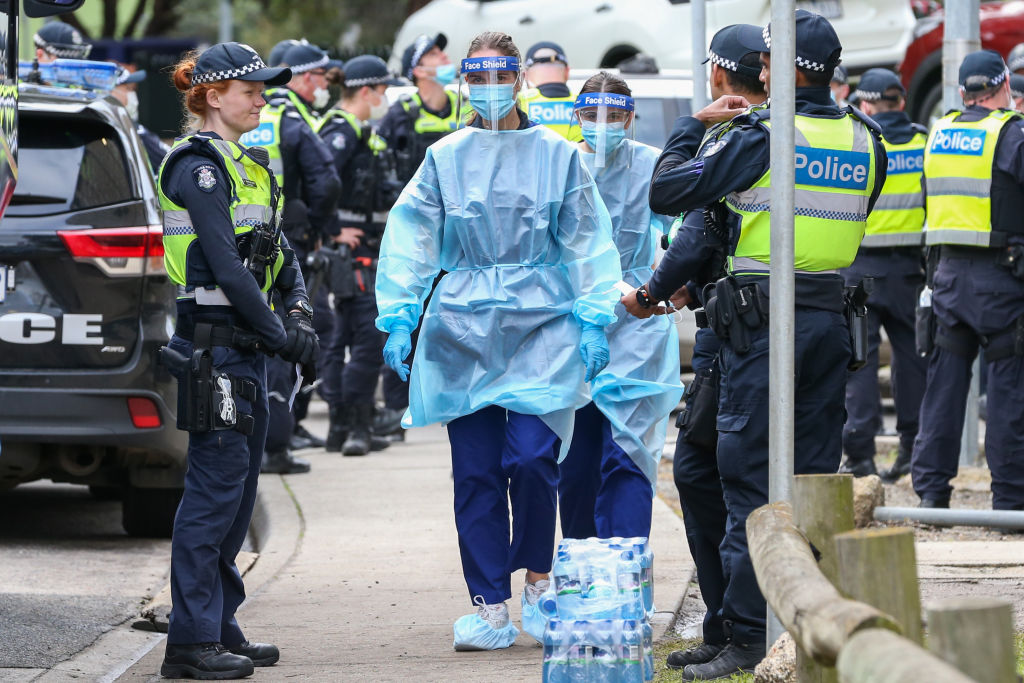Covid-19 is just one of the invisible enemies Australia must face
Posted By Kristina Keneally on July 16, 2020 @ 15:13

Coronavirus is an invisible enemy, a threat that changes how we live and work, how our children go to school and how we expect our governments to respond to crises. It is wreaking havoc across the globe on developed and developing nations alike.
While the threat of a global pandemic has always loomed, its impact on Australia’s sovereignty and security has not been at the forefront of this government’s mind.
In a speech in March 2019 outlining the future national security challenges Australia faces, Home Affairs Secretary Michael Pezzullo warned [1] of the ‘seven “gathering storms” of the 2020s’. Not one of these was a global pandemic.
In seven years [2] of being in power the government has not run a national pandemic exercise. The Home Affairs Department was briefly made responsible for national crisis coordination, but then the prime minister gave the job instead to the National Covid-19 Coordination Commission. It’s unclear what was achieved through this or what the impact has been on our national security.
There are three other national security threats which, just like the coronavirus, have the potential to undermine Australia’s safety, security and democracy. None is new, but in a pandemic-stricken world, the threat of each is growing to an unprecedented size and scale.
The first is foreign interference. In February, as the coronavirus began to take hold across the globe, ASIO Director-General Mike Burgess warned in his first annual threat assessment that ‘almost every sector of our community is a potential target for foreign interference’. He even went as far as to say the threat is ‘higher now than it was at the height of the cold war’.
Despite this stark warning, the government has done little to communicate with and educate the public and private sectors about, and equip them to deal with, the threat posed by foreign interference. Even less appears to have been done about the problem itself—despite the government’s establishment of an $87.8 million taskforce in December [3] and new espionage and foreign interference laws, passed with Labor’s support in 2018.
Local, state and federal agencies—along with businesses and communities—need to be aware of how foreign actors can manipulate and influence their actions so they can protect themselves. A starting point would be to provide a form of practical education to elected representatives, public servants and the private sector, something even Liberal MP Gladys Liu asked for [4] following her election last year.
Three weeks ago, Prime Minister Scott Morrison stood before Australians and levelled with them on another significant invisible enemy: cyberattacks. We have been, and continue to be, under cyberattack by a sophisticated state-based actor. Criminal groups round out the cybersecurity threat, exploiting weaknesses that have arisen during the Covid-19 pandemic.
The invisible enemies that threaten Australia’s cybersecurity can no longer be ignored. However, we still do not have a new cybersecurity strategy in place—the 2016 strategy expired in April—and we have not had a dedicated cybersecurity minister since 2018.
A more informed public will strengthen our cyber resilience and an approach to cybersecurity that treats it as a threat to public health will strengthen the responses of all levels of government. But leadership is required to achieve this. Just as public health experts recognise the collective benefits of improving the overall health of a population, cybersecurity experts recognise the collective benefits of lifting a nation’s cybersecurity capabilities.
Finally, right-wing extremism, which was once an invisible enemy, is now finding new opportunities to rear its ugly head.
While the home affairs minister has [5] said the dark web is fuelling right-wing extremism, the reality is far simpler, but equally sinister. Nazi memorabilia is being sold [6] on Facebook Marketplace and ASIO’s director-general has said [7], ‘In suburbs around Australia, small cells regularly meet to salute Nazi flags, inspect weapons, train in combat and share their hateful ideology.’
Covid-19 has fuelled the spread of extremist messages, and we’ve seen an undeniable rise in nationalist, xenophobic sentiment that right-wing extremists are exploiting [8]. The nature of a global pandemic also affords these groups an unprecedented opportunity to recruit socially isolated people who are spending increasing amounts of time online.
On a broad level, the government should back the calls of peak multicultural bodies for a national, bipartisan anti-racism campaign to help ensure racist narratives can’t be used by right-wing extremists as an on-ramp to more extreme ideologies.
On a community level, the government could fund community-based programs and provide practical advice to parents, teachers, youth workers and even local churches to recognise and combat the rise of right-wing extremism.
The proscription of a right-wing organisation—international or domestic—would also send a powerful message that these extremist views will not be tolerated. Currently, 25 of Australia’s 26 proscribed groups are Islamist, with the other being the Kurdistan Workers’ Party, or PKK. But as we’re hearing regularly from our security agencies, these groups are not the sum total of the problem. If acted on by the government, Labor would support measures to proscribe extreme right-wing organisations.
These invisible enemies threaten Australia’s safety, security and democracy and require a thoughtful and united approach. Labor stands ready and willing to work with the government, including through the parliament and its Joint Committee on Intelligence and Security, in the interests of all Australians.
There have been very few seismic events in our history like this pandemic that have touched the lives of all Australians. But while we recognise the obvious challenges posed by Covid-19, we must be vigilant to the more covert challenges it may present. We cannot risk being underprepared and falling victim to any other invisible enemies.
Article printed from The Strategist: https://www.aspistrategist.org.au
URL to article: https://www.aspistrategist.org.au/covid-19-is-just-one-of-the-invisible-enemies-australia-must-face/
URLs in this post:
[1] warned: https://www.homeaffairs.gov.au/news-media/speeches/aspi-13-march-2019
[2] seven years: https://www.abc.net.au/news/2020-04-20/coronavirus-australia-ran-its-last-pandemic-exercise-in-2008/12157916
[3] December: https://www.pm.gov.au/media/stepping-australias-response-against-foreign-interference
[4] asked for: https://www.theaustralian.com.au/nation/politics/our-chinese-mp-gladys-liu-wants-asio-help/news-story/be750a13c6ece7993feaa7421a96dd9d
[5] has: https://thewest.com.au/news/australia/home-affairs-minister-peter-dutton-dark-web-is-fuelling-right-wing-extremism-among-our-youth-ng-b881476633z
[6] sold: https://7news.com.au/news/social/jewish-community-says-online-trade-in-nazi-memorabilia-is-an-affront-to-holocaust-victims-c-469231
[7] said: https://www.asio.gov.au/director-generals-annual-threat-assessment.html
[8] exploiting: https://www.abc.net.au/news/2020-06-12/asio-briefing-warns-far-right-is-exploiting-coronavirus/12344472
Click here to print.